(Press-News.org) (LOS ANGELES) - There are many mechanisms by which the body responds to foreign invaders. One of these involves the T-cells of the immune system, which have a number of different proteins on their surface called "checkpoint proteins." These checkpoint proteins bind to proteins on the surface of other cells and can result in either stimulation or suppression of T-cell activity. Normally, surface proteins on foreign or invading cells will produce a stimulation of T-cell activity against these cells, while T-cell suppression is a built-in mechanism to prevent the immune system from attacking the body's own normal cells.
Tumor cells, however, can sometimes outwit the immune system by displaying surface proteins that bind with T-cell checkpoint proteins to cause suppression of T-cell activity. In some cases, interaction of these tumor surface proteins with T-cells even causes the T-cells to rupture. In recent years, scientists have been trying to develop "checkpoint inhibitor" drugs which will counteract these suppressive checkpoint interactions in order to re-activate the body's immune response to tumor cells. One of these drugs is U.S. FDA approved to treat metastatic melanoma; others are available or under development to treat other malignancies.
Despite these advances, however, it remains difficult to determine which cancer patients are likely candidates for this type of therapy and which drugs have the most potential. Developing a method to address these challenges would be instrumental in determining the safest, most effective drugs for cancer patients while saving time and money in the process. In order for such a method to be practical for clinical use, it should be able to achieve rapid testing of large numbers of potential immunotherapy drugs against live tumor cells for accurate, easily analyzable data.
A collaborative team from the Terasaki Institute for Biomedical Innovation (TIBI) has successfully designed and tested such a system. They began by culturing spherical aggregates of breast cancer cells in a custom-fabricated, 3D printed, transparent chip with conical microwells. These microwells were designed for optimum growth and stability of the cellular spheres. Tests performed on the microwells' cellular spheres confirmed the cells' viability and their production of T-cell de-activating surface proteins.
"The features of our microwell-based chip is the key to our successful development of an immunoactive tissue model," said Wujin Sun, Ph.D., from the Terasaki Institute's team. "The chip's transparency allows for direct microscopic observation. And its design allows for high-volume testing, which lends itself well to the rapid screening of immunotherapeutic drugs."
In order to test the effectiveness of checkpoint inhibitor drugs in activating T-cells' anti-tumor response, the team next considered how a T-cell normally behaves during activation. When a T-cell is stimulated to attack cellular invaders, it secretes proteins called cytokines, which mobilize other immune cells to the invasion site and stimulates the cells to multiply and destroy the invaders. Measurement of these cytokines can therefore indicate the level of a T-cell's activation.
The team then created an efficient, automated system to measure cytokine levels using their breast cancer-laden microwell chip. Experiments with this system were performed using anti-checkpoint protein drugs; the results showed that upon incubation of the breast cancer cells with the T-cells, cytokine production was increased by the use of the drugs, demonstrating their effectiveness in activating the T-cells.
Another way the team used their breast cancer chip was to assess the breast cancer cells' effect on stimulated T-cells. The T-cells were fluorescently labeled and added to the breast cancer cells in the microwells; the chip's transparency allowed direct observation of their cellular interaction using fluorescent microscopy. These breast cancer cells normally cause rupture of the T-cells, but experiments conducted with checkpoint inhibitor drugs showed that the drugs increased T-cell viability in the cultures, visually demonstrating how they can counter the effects of T-cell rupture by tumor cell interaction.
The breast cancer chip was also used for the direct observation of how the T-cells infiltrated the breast cancer cellular spheres; this type of infiltration is a measure of a T-cell's anti-tumor activity and viability. After labeling each group of cells with separate dyes and mixing them in the chip's microwells, T-cell infiltration could be directly visualized using high resolution fluorescence microscopy. Experiments conducted with checkpoint inhibitor drugs indicated that there were increased numbers of T-cells and deeper penetration into the breast cancer cells in the presence of the drugs.
In summary, the TIBI researchers were able to design robust and efficient methods for characterizing the interaction between tumor and immune cells and for rapid, high-volume and clinically-relevant ways to screen immunotherapeutic drugs against tumor cells. The microwell chip and its related apparatus can also be used to include other types of tumor cells and individual patient cells for optimizing patient response and for screening and developing additional anti-cancer drugs.
"Bringing ways to optimize clinical decisions and personalized medicine for patients is a top goal at our institute," said Ali Khademhosseini, Ph.D., director and CEO of the Terasaki Institute. "This work is a significant step towards achieving that goal in the realm of cancer immunotherapy."
INFORMATION:
Additional authors are Xing Jiang, Li Ren, Peyton Tebon, Canran Wang, Xingwu Zhou, Moyuan Qu, Jixiang Zhu, Haonan Ling, Shiming Zhang, Yumeng Xue, Qingzhi Wu, Praveen Bandaru, Junmin Lee, Han-Jun Kim, Samad Ahadian, Nureddin Ashammakhi, Mehmet R. Dokmeci, Jinhui Wu, Zhen Gu, and Ali Khademhosseini.
Financial support came from the National Institutes of Health (CA214411).
PRESS CONTACT
Stewart Han, shan@terasaki.org, +1 818-836-4393
Terasaki Institute for Biomedical Innovation
The Terasaki Institute for Biomedical Innovation (terasaki.org) is a non-profit research organization that invents and fosters practical solutions that restore or enhance the health of individuals. Research at the Terasaki Institute leverages scientific advancements that enable an understanding of what makes each person unique, from the macroscale of human tissues down to the microscale of genes, to create technological solutions for some of the most pressing medical problems of our time. We use innovative technology platforms to study human disease on the level of individual patients by incorporating advanced computational and tissue-engineering methods. Findings yielded by these studies are translated by our research teams into tailored diagnostic and therapeutic approaches encompassing personalized materials, cells and implants with unique potential and broad applicability to a variety of diseases, disorders and injuries.
The Institute is made possible through an endowment from the late Dr. Paul I Terasaki, a pioneer in the field of organ transplant technology.
Australia's and New Zealand's first set of clinical guidelines for children's head injuries has been created by a network of specialists based at the Murdoch Children's Research Institute (MCRI).
The guidelines, developed by the Paediatric Research in Emergency Departments International Collaborative (PREDICT) and published in Emergency Medicine Australasia, will allow emergency department clinicians to best diagnose and treat children's head injuries while reducing unnecessary exposure to radiation from CT scans. They also address head injuries in children with underlying problems, such as a bleeding disorder.
Matthew ...
PITTSBURGH, 2 February, 2021 - Researchers seeking to develop on-demand and behaviorally congruent HIV prevention options for people who practice anal sex are reporting the results of three early phase clinical trials of rectal microbicides at this week's HIV Research for Prevention (HIV R4P) Virtual Conference. The Phase I studies, led by the U.S. National Institutes of Health (NIH)-funded Microbicide Trials Network (MTN), found both of two gel-based products well-tolerated, with higher doses of the active drugs likely required to provide protection from HIV and other sexually transmitted infections (STIs). The results are being presented ...
Hydrocarbons and petroleum are almost synonymous in environmental science. After all, oil reserves account for nearly all the hydrocarbons we encounter. But the few hydrocarbons that trace their origin to biological sources may play a larger ecological role than scientists originally suspected.
A team of researchers at UC Santa Barbara and Woods Hole Oceanographic Institution investigated this previously neglected area of oceanography for signs of an overlooked global cycle. They also tested how its existence might impact the ocean's response to oil spills.
"We demonstrated that there is a massive and rapid hydrocarbon cycle that occurs in the ocean, and that it is distinct from the ocean's capacity to respond to petroleum input," said Professor David Valentine(link ...
A new Veterans Affairs study finds that delays in undergoing colonoscopy following an abnormal stool test increase the risk of a colorectal cancer diagnosis and cancer-related death.
The results appeared online in the journal Gastroenterology in January 2021.
In a retrospective study of more than 200,000 Veterans, the researchers found that patients who received colonoscopy more than 13 months after an abnormal stool blood test were up to 1.3 times more likely to have colorectal cancer, compared with those who had colonoscopy up to three months after the stool test. Odds of an advanced stage of cancer at diagnosis were up to 1.7 times higher when colonoscopy was delayed beyond 16 months.
The findings also ...
The complex mechanics determining how galaxies spin, grow, cluster and die have been revealed following the release of all the data gathered during a massive seven-year Australian-led astronomy research project.
The scientists observed 13 galaxies at a time, building to a total of 3068, using a custom-built instrument called the Sydney-AAO Multi-Object Integral-Field Spectrograph (SAMI), connected to the 4-metre Anglo-Australian Telescope (AAT) at Siding Spring Observatory in New South Wales. The telescope is operated by the Australian National University.
Overseen by the ARC Centre of Excellence for All Sky Astrophysics ...
A combination of genetic mutations may explain the higher incidence of and poorer outcomes from pediatric leukemia in Hispanic and Latino children, according to Penn State College of Medicine researchers. They said a novel therapeutic drug combination - as well as testing for these mutations - may help address the disparity.
Hispanic and Latino children are between 1.2 and 1.75 times more likely to develop B-cell acute lymphoblastic leukemia (B-ALL), the most common childhood cancer, than non-Hispanic and Latino children. They also have a 40% higher death rate than their counterparts after correcting for socioeconomic factors. Dr. Sinisa Dovat, a researcher and pediatric ...
COLUMBUS, Ohio - People who start adulthood with a body mass index (BMI) in the normal range and move later in life to being overweight - but never obese - tend to live the longest, a new study suggests.
Adults in this category lived longer than even those whose BMI stayed in the normal range throughout their life. Those who started adulthood as obese and continued to add weight had the highest mortality rate.
"The impact of weight gain on mortality is complex. It depends on both the timing and the magnitude of weight gain and where BMI started," said Hui Zheng, lead author of the study and associate ...
According to the Barker hypothesis (Hales and Barker 1992) (also referred to as "small baby syndrome"), infants with too low body weight have an increased risk of suffering from cardiovascular diseases, high blood pressure, diabetes and chronic kidney diseases in adulthood. According to this hypothesis, fetal protective mechanisms enable adaptation to unfavorable intrauterine conditions (chronic oxygen or nutrient deficiency) and allow for fetal survival. At the same time, however, they lead to permanent structural and functional strains and changes into adulthood. The comprehensive study recently published in Nature Communications now clarifies central mechanisms of this phenomenon.
Fetuin-A plays a key role
Under the program of the Swiss National ...
ATLANTA - FEBRUARY 2, 2021 - A new study finds that long-term aspirin use before a diagnosis of colorectal cancer (CRC) may be associated with lower CRC-specific mortality. The report that appears in JNCI: The Journal of the National Cancer Institute, suggests that the findings for pre-diagnosis aspirin use might help reduce CRC mortality in the overall population by limiting metastatic spread of colorectal tumors before diagnosis. Preventing distant metastases leads to fewer deaths from colorectal cancer.
The study, led by Peter T. Campbell, PhD, of the American Cancer Society, used data from men and women enrolled in the American Cancer Society's Cancer Prevention Study-II (CPS-II) Nutrition Cohort who were cancer-free ...
A surgical procedure meant to counter ulcerative colitis, an immune disease affecting the colon, may trigger a second immune system attack, a new study shows.
The study results revolve around the immune system, the cells and proteins that destroy invading bacteria and viruses. Activating it brings about inflammation, responses like swelling and pain that result from cells homing in on the site of infection or injury. Autoimmune diseases like ulcerative colitis occur when this system mistakenly damages the body's own tissues.
Colon tissue damaged by the disease is routinely addressed with a "J-pouch" procedure wherein a pouch is surgically constructed from nearby, healthy ...



